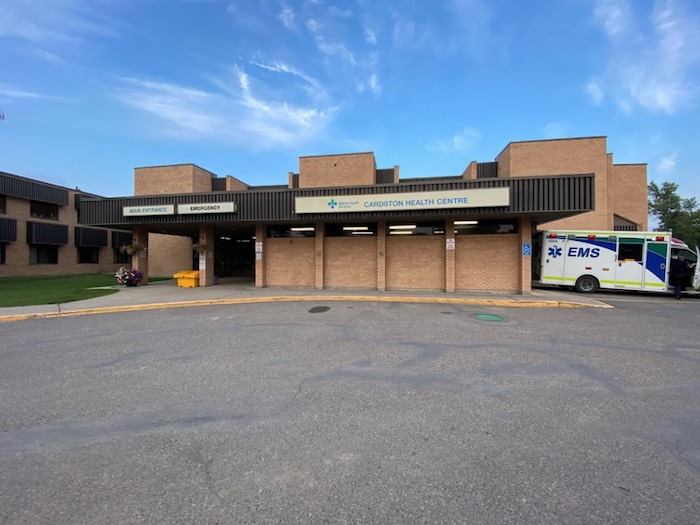Alberta
Province trumpets $105 million in new health spending for Rural Health Facilities Revitalization Program

Strengthening rural health care
Budget 2023 expands rural health supports so Albertans can have additional access to modern health facilities and the care they need where and when they need it.
Alberta’s government is committed to expanding and modernizing rural hospitals and other health facilities across the province to protect quality health care, grow system capacity and support the best front-line health care workers in the world.
Having access to quality health care when and where Albertans need it includes expanding capacity to provide better access for Albertans living in rural and remote areas of the province.
“We are making sure we have the necessary funding in place to build and strengthen health care in our rural communities and address barriers to care for those looking for support and treatment close to home and family. This work includes programs that focus on how to recruit, retain and even train more physicians, nurses and other professionals in areas outside of the cities.”
Budget 2023 provides $105 million over three years for the Rural Health Facilities Revitalization Program, including $75 million in additional funding for capital projects in rural Alberta.
The program supports strategic renovations and developments in health facilities throughout the province, with an emphasis on emergency departments, EMS stations, surgical and dialysis clinics, and other clinical services to improve access to health care in rural Alberta.
Expanding capacity in the health care system also means having health care workers to fill those spots. In response, Alberta’s government launched the Health Workforce Strategy to attract and retain the health care workers needed now and create more training opportunities for local students and internationally trained medical graduates.
“All Albertans, no matter where they live, need and deserve access to our health system. Physicians are a critical part of that system, especially in rural areas where we are trusted to support the needs of neighbours, friends and colleagues during all phases of life. It is a special calling to work in rural health care, but it can be tremendously rewarding for those who pursue it.”
Rural Albertans are especially affected by the nationwide shortage of health care workers. To address this growing need, the Health Workforce Strategy provides $113 million to add 100 residency training spaces for newly graduated doctors, particularly in rural areas and specialist fields. Creating these new training spaces will provide more opportunities for Alberta students to learn, train and practise in their home communities.
In addition to this investment, a further $1 million will go toward exploring ways that regional post-secondary institutions, such as the University of Lethbridge and Northwestern Polytechnic in Grande Prairie, can help deliver medical education outside of Edmonton and Calgary.
“Whether it’s emergency care or surgeries, primary care or continuing care, Albertans deserve equitable health care services in their communities. I am proud of the investments government is making through Budget 2023, both with infrastructure funding and workforce planning strategies, to help support the future of rural health care in our province.”
This year’s budget also funds the new agreement with the Alberta Medical Association, further stabilizing the health system and focusing on Alberta’s rural communities. Under the agreement, more than $250 million over four years will go to addressing pressures, including recruitment and retention programs so more Albertans can access family doctors, and supporting physicians so their practices remain viable.
Budget 2023 secures Alberta’s future by transforming the health care system to meet people’s needs, supporting Albertans with the high cost of living, keeping our communities safe and driving the economy with more jobs, quality education and continued diversification.
Quick facts
- The Rural Health Revitalization Program provides capital funding for revitalizing select rural health facilities throughout the province.
- Budget 2023 invests $105 million over three years for the Rural Health Facilities Revitalization Program. This includes $75 million in additional funding for new capital projects in rural Alberta.
- To date, about $65 million has been committed to 22 projects across the province, including emergency department renovations, upgrades to EMS stations and new dialysis spaces.
- An investment of $237 million over three years towards the Alberta Surgical Initiative Capital Program will help reduce surgical wait times and help Albertans receive the surgeries they need.
- This includes $120 million in new funding for projects in 15 communities across the province to expand and modernize operating rooms in public hospitals.
- Budget 2023 includes $64 million over three years to continue the La Crete Community Health Centre capital project to provide increased access to maternity health services.
- $11 million over three years is part of a $23.5-million commitment to expand the renal dialysis program at the Chinook Regional Hospital in Lethbridge.
- This project will relocate the dialysis unit to provide additional treatment spaces and address patient and staff safety concerns with the current site.
- $3 million over three years in planning dollars is committed to the North Calgary/Airdrie Regional Health Centre.
- $3 million over three years in planning dollars is committed to expanding the Strathcona Community Hospital.
- Planning dollars are also committed for new or upgraded facilities in Bassano, Cardston and Whitecourt.
Alberta
Central Alberta MP resigns to give Conservative leader Pierre Poilievre a chance to regain a seat in Parliament

From LifeSiteNews
Conservative MP Damien Kurek stepped aside in the Battle River-Crowfoot riding to allow Pierre Poilievre to enter a by-election in his native Alberta.
Conservative MP Damien Kurek officially resigned as an MP in the Alberta federal riding of Battle River-Crowfoot in a move that will allow Conservative Party of Canada leader Pierre Poilievre to run in a by-election in that riding to reclaim his seat in Parliament.
June 17 was Kurek’s last day as an MP after he notified the House Speaker of his resignation.
“I will continue to work with our incredible local team to do everything I can to remain the strong voice for you as I support Pierre in this process and then run again here in Battle River-Crowfoot in the next general election,” he said in a statement to media.
“Pierre Poilievre is a man of principle, character, and is the hardest working MP I have ever met,” he added. “His energy, passion, and drive will have a huge benefit in East Central Alberta.”
Kurek won his riding in the April 28 election, defeating the Liberals by 46,020 votes with 81.8 percent of the votes, a huge number.
Poilievre had lost his Ottawa seat to his Liberal rival, a seat that he held for decades, that many saw as putting his role as leader of the party in jeopardy. He stayed on as leader of the Conservative Party.
Poilievre is originally from Calgary, Alberta, so should he win the by-election, it would be a homecoming of sorts.
It is now up to Prime Minister of Canada Mark Carney to call a by-election in the riding.
Carney had promised that he would “trigger” a by-election at once, saying there would be “no games” trying to prohibit Poilievre from running and win a seat in a safe Conservative riding.
Despite Kurek’s old seat being considered a “safe” seat, a group called the “Longest Ballot Committee” is looking to run hundreds of protest candidates against Poilievre in the by-election in the Alberta Battle River–Crowfoot riding, just like they did in his former Ottawa-area Carleton riding in April’s election.
Alberta
Alberta pro-life group says health officials admit many babies are left to die after failed abortions

From LifeSiteNews
Alberta’s abortion policy allows babies to be killed with an ‘induced cardiac arrest’ before a late-term abortion and left to die without medical care if they survive.
A Canadian provincial pro-life advocacy group says health officials have admitted that many babies in the province of Alberta are indeed born alive after abortions and then left to die, and because of this are they are calling upon the province’s health minister to put an end to the practice.
Official data from the Canadian Institute for Health Information (CIHI), which is the federal agency in charge of reporting the nation’s health data, shows that in Alberta in 2023-2024, there were 133 late-term abortions. Of these, 28 babies were born alive after the abortion and left to die.
As noted by Prolife Alberta’s President Murray Ruhl in a recent email, this means the reality in the province is that “some of these babies are born alive… and left to die.”
“Babies born alive after failed late-term abortions are quietly abandoned—left without medical help, comfort, or even a chance to survive,” noted Ruhl.
This fact was brought to light in a recent opinion piece published in the Western Standard by Richard Dur, who serves as the executive director of Prolife Alberta.
Ruhl observed that Dur’s opinion piece has “got the attention of both Alberta Health Services (AHS) and Acute Care Alberta (ACA),” whom he said “confirmed many of the practices we exposed.”
Alberta’s policy when it comes to an abortion committed on a baby older than 21 weeks allows that all babies are killed before being born, however this does not always happen.
“In some circumstances… the patient and health practitioner may consider the option of induced fetal cardiac arrest prior to initiating the termination procedures,” notes Alberta Health Services’ Termination of Pregnancy, PS-92 (PS-92, Section 6.4).
Ruhl noted that, in Alberta, before an “abortion begins, they stop the baby’s heart. On purpose. Why? Because they don’t want a live birth. But sometimes—the child survives. And what then?”
When it comes to the same policy for babies older that 21 weeks, the policy states, “For terminations after 21 weeks and zero (0) days there must be careful consideration and documentation concerning a Do Not Resuscitate order in anticipation of a possible live birth.” (PS-92, Section 6.4).”
Ruhl observed that the reality is, “They plan in advance not to save her—even if she’s born alive.”
If the baby is born alive, the policy states, “Comfort measures and palliative care should be provided.” (PS-92, Section 6.4).
This means, however, that there is no oxygen given, no NICU, “no medical care,” noted Ruhl.
“Their policies call this ‘palliative care.’ We call it what it is: abandonment. Newborns deserve care—not a death sentence,” he noted.
As reported by LifeSiteNews recently, a total of 150 babies were born after botched abortions in 2023-2024 in Canada. However, it’s not known how many survived.
Only two federal parties in Canada, the People’s Party of Canada, and the Christian Heritage Party, have openly called for a ban on late abortions in the nation.
Policy now under ‘revision’ says Alberta Health Services
Ruhl said that the province’s policies are now “under revision,” according to AHS.
Because of this, Ruhl noted that now is the time to act and let the province’s Health Minister, Adriana LaGrange, who happens to be pro-life, act and “demand” from her real “action to protect babies born alive after failed abortions.”
The group is asking the province to do as follows below:
- Amend the AHS Termination of Pregnancy policy to require resuscitative care for any baby born with signs of life, regardless of how the birth occurred.
- Require that these newborns receive the same level of care as any other premature baby. Newborns deserve care—not a death sentence.
- Recognize that these babies have a future—there is a literal waiting list of hundreds of families ready to adopt them. There is a home for every one of them.
While many in the cabinet and caucus of Alberta Premier Danielle Smith’s United Conservative government are pro-life, she has still been relatively soft on social issues of importance to conservatives, such as abortion.
-

 Health2 days ago
Health2 days agoLast day and last chance to win this dream home! Support the 2025 Red Deer Hospital Lottery before midnight!
-

 conflict2 days ago
conflict2 days ago“Evacuate”: Netanyahu Warns Tehran as Israel Expands Strikes on Iran’s Military Command
-

 Aristotle Foundation2 days ago
Aristotle Foundation2 days agoThe Canadian Medical Association’s inexplicable stance on pediatric gender medicine
-

 Energy2 days ago
Energy2 days agoCould the G7 Summit in Alberta be a historic moment for Canadian energy?
-

 Bruce Dowbiggin2 days ago
Bruce Dowbiggin2 days agoWOKE NBA Stars Seems Natural For CDN Advertisers. Why Won’t They Bite?
-

 Crime2 days ago
Crime2 days agoMinnesota shooter arrested after 48-hour manhunt
-

 Uncategorized2 days ago
Uncategorized2 days agoKananaskis G7 meeting the right setting for U.S. and Canada to reassert energy ties
-

 Business2 days ago
Business2 days agoCarney’s Honeymoon Phase Enters a ‘Make-or-Break’ Week





